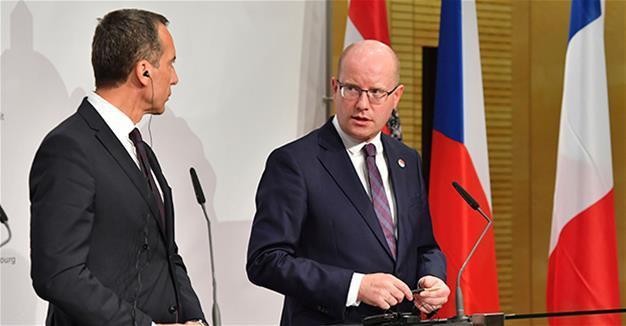Prague suggests status for states outside Eurozone
PRAGUE - Agence France-Presse

Czech Prime Minister Bohuslav Sobotka suggested Monday that EU members like his that do not use the euro currency be granted observer status to boost mutual trust in the bloc.
Of the 28 members of the European Union, 19 also belong to the eurozone. The rest -- Britain, Bulgaria, Croatia, the Czech Republic, Denmark, Hungary, Poland, Romania, and Sweden -- use their own currency.
“The countries that don’t use the euro could benefit from observer status during meetings of the eurozone countries,” Sobotka said during an annual meeting with Czech ambassadors.
“The Czech Republic is putting forth the idea. We’ll see if it gains wider support,” he added, quoted by the Czech news agency CTK.
The leftist premier added that observer status could “boost mutual confidence” and “prevent a wedge from being driven” between EU members outside the eurozone and those inside.
The Czech Republic joined the EU in 2004, 15 years after the fall of communism, and as part of its accession took on the obligation to eventually drop its koruna currency and adopt the euro after meeting economic criteria like a small budget deficit, low inflation, and low interest rates.
However, much like in fellow Central European nations Hungary and Poland, there has been little enthusiasm for, and progress towards, adopting the euro in the Czech Republic.
The country is “not preparing” to adopt the euro, according to former finance minister Andrej Babis, the billionaire leader of the centrist ANO movement that is the clear odds-on favorite in parliamentary elections due in October.
The Czech National Bank (CNB) governor Jiri Rusnok for his part said last year when taking up the job that he did not expect his country to enter the eurozone during the six years of his mandate.
 Czech Prime Minister Bohuslav Sobotka suggested Monday that EU members like his that do not use the euro currency be granted observer status to boost mutual trust in the bloc.
Czech Prime Minister Bohuslav Sobotka suggested Monday that EU members like his that do not use the euro currency be granted observer status to boost mutual trust in the bloc.